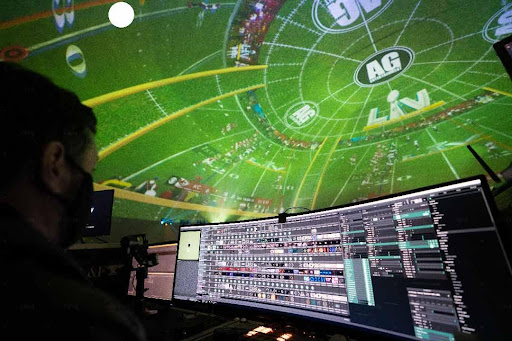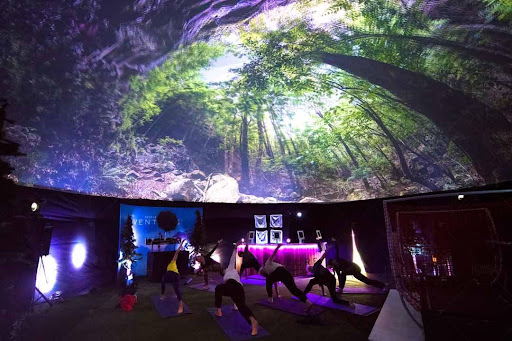Projection domes are a revolutionary technology that is transforming the way people experience immersive content. These domes are large, spherical structures that are designed to create a fully immersive environment for viewers. They are typically used to project images and videos onto their curved surfaces, creating a 360-degree field of view that surrounds the viewer. In this blog post, we will explore how projection domes are revolutionizing the immersive experience and the different ways they are being used today.
VR Projection Dome Yoga Space at Capital One Venture Dome by Lumen and Forge
What Are Projection Domes?
A projection dome is a spherical structure that is designed to create a fully immersive environment for viewers. These domes are typically made of lightweight materials such as PVC, polyester, or nylon and are constructed using a frame of poles or inflatable tubes. The dome is then covered with a high-quality projection fabric that is optimized for image and video projection. The dome is often equipped with a high-powered projector that is capable of projecting images and videos onto the curved surface of the dome.
How Are Projection Domes Revolutionizing the Immersive Experience?
Projection domes are revolutionizing the immersive experience in several ways. Here are some of the most important:
1.360-Degree Viewing Experience
One of the most significant benefits of projection domes is that they provide a 360-degree viewing experience. This means that viewers can immerse themselves fully in the content being displayed and experience it from all angles. This creates a much more engaging and immersive experience than traditional flat-screen displays or even VR headsets.
2.Versatility
Projection domes are also incredibly versatile. They can be used for a wide range of applications, including immersive entertainment, education, and training. They can also be used for marketing and advertising, as well as for trade shows and exhibitions. This versatility means that projection domes can be used in a wide range of settings and for a variety of purposes.
3.Increased Engagement
Another benefit of projection domes is that they increase engagement levels. Because viewers are fully immersed in the content being displayed, they are more likely to pay attention and stay engaged. This makes projection domes an ideal technology for education and training, as well as for marketing and advertising.
4.Large Audience Capacity
Projection domes are also capable of accommodating large audiences. Depending on the size of the dome, they can accommodate anywhere from a few dozen to several hundred people at once. This makes them an ideal choice for immersive events and experiences, where large groups of people need to be accommodated.
Applications of Projection Domes
Projection domes are being used today in a wide range of applications. Here are some of the most common:
1.Entertainment
One of the most common applications for projection domes is immersive entertainment. These domes can be used to create fully immersive experiences for audiences, ranging from immersive cinema experiences to interactive gaming events.
2.Education and Training
Projection domes are also being used for education and training purposes. These domes can be used to create immersive training simulations, allowing users to experience complex scenarios in a safe and controlled environment. They are also being used in classrooms and museums to create immersive learning experiences.
3.Marketing and Advertising
Projection domes are also being used for marketing and advertising purposes. These domes can be used to create immersive brand experiences, allowing companies to engage with their customers in a more meaningful way. They are also being used for trade shows and exhibitions, where they can be used to showcase products and services in an immersive and engaging way.

Conclusion
Projection domes are revolutionizing the immersive experience in a variety of ways. They are providing viewers with a fully immersive 360-degree viewing experience that is more engaging and immersive than traditional flat-screen displays. They are also incredibly versatile and can be used for a wide range of applications, including entertainment, education, training, and marketing.
